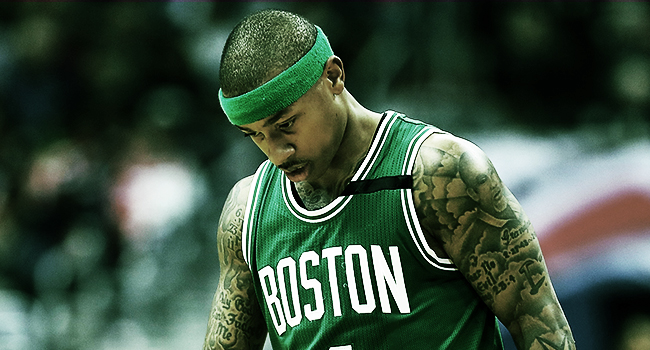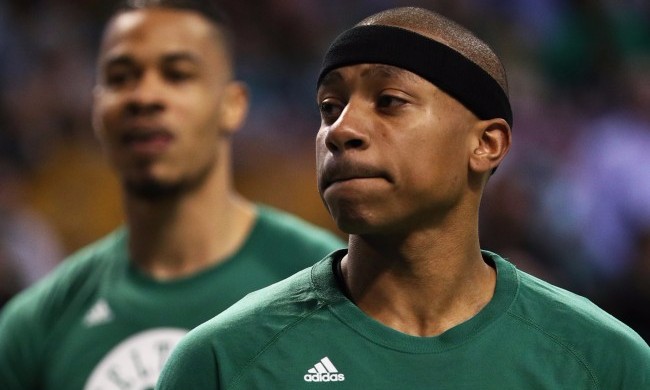
For the last two years, Isaiah Thomas has been the face of the Boston Celtics. Even more importantly, he has been the heart and soul of the franchise — the Celtics are one of those professional sports teams that have a certain aura around them, and like all teams that have this aura, there’s usually one player who understands the significance of wearing said team’s jersey.
Since his first full season with the team in 2015-16, Thomas was that kind of player. That was especially the case the following year, when Thomas was a legitimate MVP candidate and the driving force behind the team with the best record in the Eastern Conference. He played hurt. He got hurt during games and kept playing. He even suited up and played in a postseason game a day after his sister died in a car crash despite the fact that his head coach said that he was struggling in the aftermath of the tragedy.
Basically, Thomas was the Boston Celtics, which made it so weird that the team traded him to the Cavaliers in the deal that netted Boston Kyrie Irving. This is far more understandable when you view it through a very simple prism: Thomas really wanted to get paid. This is because, well, money is a thing that people need and Thomas, as a superstar in the NBA who has never cashed in on a huge payday, wants to make what the market determines he is worth, which is — [crunches numbers] — a lot of money.

Now before we go any further, one kind of important fact needs to be addressed. Boston giving Thomas a max deal or anything close to it would have been really, really risky. While Thomas is adamant that his health issues aren’t anything to worry about, hip injuries are tricky. His defensive limitations are well-documented, and tying up a ton of money into any 29 year old player is a risk, especially an undersized scorer like Thomas who history tells us won’t age especially well.
But while it was a good business move to get something in return for Thomas — especially when that something is a player the caliber of Irving — on a personal level, this deal was brutal. The Celtics decided that instead of paying someone who bled green like no one since Paul Pierce or Kevin Garnett, they wanted to absolve themselves of any responsibility and put the burden of being the team that is in a position to give Thomas a max deal on someone else.
Boston passed on the most logical way to do this earlier this offseason, when it traded the No. 1 pick in the 2017 NBA Draft to Philadelphia. The Celtics could have had Markelle Fultz, put him on the court with Thomas for a year, and then handed the reigns to the promising young point guard. It would have been kind of crappy to let Thomas walk and spend a year playing with his obvious successor, but at least the team doesn’t look like it does now.
Instead, Thomas’ departure from Boston — which seems like it is going to happen after a few days of uncertainty — is a messy breakup between a player who wanted to stay somewhere for a long time and a team that didn’t want him.

A day after Thomas was traded, there was a report that some of his teammates were not fond of him, which isn’t the first time something like this has curiously popped up soon after an athlete/coach has left Boston. This statement was based on Chris Broussard talking to people around the league, and one of Thomas’ former Celtics teammates wholeheartedly denied this charge, which makes it sound like the kind of thing that gets leaked by someone who wants the franchise to look good after trading away its star.
Then, in the midst of a lot of back and forth between the two teams, and ESPN reporter alleged that this might have all been part of some dastardly plan by Cleveland to ruin Boston’s locker room chemistry and ultimately void this deal. This implies that a rookie general manager was able to out-savvy a front office that has been led by the same person since 2003 and has traded away popular Celtics in the past.
Thomas eventually had to go on the record and discuss his future in the league with Adrian Wojnarowski of ESPN because so much information has gotten out about his physical with the Cavaliers. It only got to that point because, again, his desire to represent the Celtics meant he was going to play on a shoddy hip, which exacerbated an injury he suffered in March and could cost him a massive portion of the 2017-18 season.

This entire situation happened because of one undeniable truth: Boston had no desire to give fives years and a whole lot of money to someone who has never earned more than $7.2 million over the course of a season.
Thomas is a unique star in that he’s never been paid like a star, so it shouldn’t come as a surprise that he wants to know what that’s like once in his career. And it’s also not a surprise that he wanted to earn that money in Boston, where he established himself as a star, became an MVP candidate, and found a fan base that appreciated his love for the organization.
But instead, the Celtics decided they didn’t want to pay him. They decided to ship him out of town and make him look bad on the way out because that was preferable in their eyes to making an investment in him. As LeBron James, Chris Paul, Ray Allen, and Caron Butler all essentially said about the deal, Thomas’ loyalty to the Celtics should have been reciprocated, not punished.






